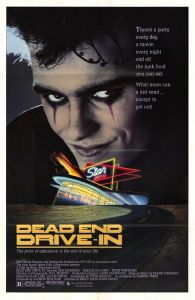 There are many different kinds of cult movies. There are those that are so specifically targeted at one particular sensibility that it’s nearly impossible for anyone but a handful to appreciate it, like “The Adventures of Buckaroo Banzai Across The Eighth Dimension.” There are others that aspire for profundity and inspire a few dedicated souls to unlock its meaning, like “Donnie Darko.” There are some that have been lost to time and require adherents to keep its memory alive the way monks used to memorize manuscripts, like “Nothing Lasts Forever.”
There are many different kinds of cult movies. There are those that are so specifically targeted at one particular sensibility that it’s nearly impossible for anyone but a handful to appreciate it, like “The Adventures of Buckaroo Banzai Across The Eighth Dimension.” There are others that aspire for profundity and inspire a few dedicated souls to unlock its meaning, like “Donnie Darko.” There are some that have been lost to time and require adherents to keep its memory alive the way monks used to memorize manuscripts, like “Nothing Lasts Forever.”
But the strangest and saddest category of these films is the “never-was” cult movie. Hundreds of productions fall under the radar every year, seen by few and remembered by fewer. There’s nothing remarkable about these, by definition. What’s more interesting are the ones that could have become obsessions but didn’t for whatever reason. “Six-String Samurai” is one of these. Continue reading

 There’s a notion baked into our national identity, as American as apple pie, that America is here to stay. The thing I personally love most about our national anthem is that it manages to make the very idea of soldiering on in the face of defeat and humiliation a heroic act. Rather than being about a great military victory or the inherent superiority of our democratic republic, “The Star-Spangled Banner’s” triumphant moment comes when Francis Scott Key realizes that the flag simply is “still there.” Although that says a lot about our national ideals of perseverance, self-reliance and determination, there’s a dark inverse of that idea implied by the anthem. It’s the idea that America can be “still there” even after it’s been broken, battered beyond all recognition, and left to limp along in a pathetic, crippled state. It’s an idea that may have had an influence on the national mindset in the post-Vietnam era. And once they made a movie about it where Jay Leno’s mother kicked him in the balls.
There’s a notion baked into our national identity, as American as apple pie, that America is here to stay. The thing I personally love most about our national anthem is that it manages to make the very idea of soldiering on in the face of defeat and humiliation a heroic act. Rather than being about a great military victory or the inherent superiority of our democratic republic, “The Star-Spangled Banner’s” triumphant moment comes when Francis Scott Key realizes that the flag simply is “still there.” Although that says a lot about our national ideals of perseverance, self-reliance and determination, there’s a dark inverse of that idea implied by the anthem. It’s the idea that America can be “still there” even after it’s been broken, battered beyond all recognition, and left to limp along in a pathetic, crippled state. It’s an idea that may have had an influence on the national mindset in the post-Vietnam era. And once they made a movie about it where Jay Leno’s mother kicked him in the balls.  Mesopotamia may be the cradle of civilization, but Australia is the birthplace of the apocalypse. Ever since George Miller unleashed “
Mesopotamia may be the cradle of civilization, but Australia is the birthplace of the apocalypse. Ever since George Miller unleashed “